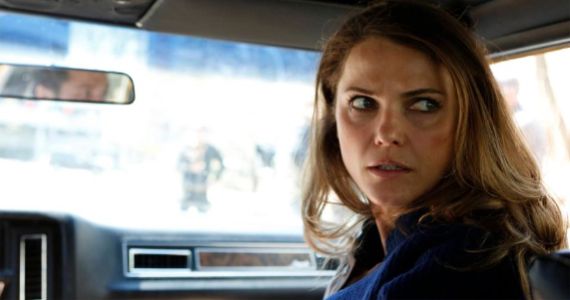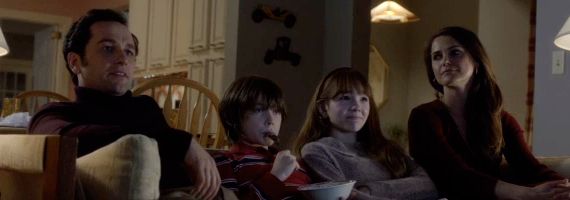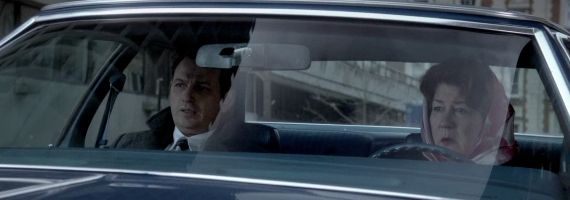One element that's made season 1 of The Americans so appealing is its startlingly emotional (and sometimes bleak) observation of a modern American marriage involving two individuals who are, for all intents and purposes, radical outsiders intent on upsetting the particular way of life they've inadvertently become accustomed to. Take out all of the intriguing spycraft, the hand-to-hand combat and the wigs, and you'd still have an incredibly compelling domestic drama on your hands.
But of course, there's more to The Americans than that; it is also an intricately woven tale of espionage told from the unique vantage point of the Cold War in the early-'80s. And as we've seen in the Soviets' dogged pursuit of anything relating to the American plans for the proposed anti-ballistic missile shield (leading up to the tension-filled meeting with Sanford Prince's pricey American colonel), sometimes the prize at the end of the race is remarkably similar to a spy's cover – i.e., a complete fiction.
There's something elegant in the way creator Joseph Weisberg and co-writer Joel Fields have subtly inserted references to the failed space-aged defense program as an elusive target for not only Philip and Elizabeth Jennings, but also nearly everyone back home in Russia.
And while it has historical significance, inasmuch as everyone from the media to President Reagan glommed onto the notion of a high-tech missile shield as the next leap forward in the ever-escalating arms race, it would prove to be a pipe dream, a game changer that simply wasn't in the cards.
As the colonel teased to a mustachioed and blonde-wigged Philip, the whole thing could be technological grandstanding, but it could also simply be a clever ruse intended to distract the enemy. In effect, the anti-ballistic missile shield was a phantom for the Russians to chase, just as the seemingly intangible illegals of Directorate S were murderous specters haunting the FBI.
And that's how things play out in 'The Colonel': with Weisberg and Fields connecting the dots they and the series' other writers strategically placed throughout the previous 12 episodes of the season. The finale does more, though; it wraps those disparate points of intrigue together in an ending that satisfyingly brings several character arcs full circle, without ending up back at square one or clearing the table and leaving themselves with no foundation on which the series might continue.
Instead, The Americans ends its stunning first season by doing what Philip had wanted to do all along: it puts family first. There's a touching back-and-forth between Philip and Elizabeth in which they recognize the other's strength as a parent and a partner, as they're faced with the very real prospect that one of the dual assignments the Center has in store for them could be a trap and will undoubtedly lead to far more permanent separation than the one they're in the midst of now. It's a concern for the preservation of one's self interests that carries over to nearly every subplot the series has developed this season.
Take for instance two characters seemingly on the fringe that have suddenly become major players as the plot has expanded. On one hand there's Claudia, who has been a mystery and a master manipulator since her debut in 'Gregory,' and while Elizabeth may not believe Grannie ever had a relationship with her much-loved Gen. Zhukov, Claudia possibly proves her wrong by taking retribution for his assassination into her own hands, dispatching Richard Patterson in a particularly horrible fashion.
Meanwhile, self-serving Nina has gone from a simple stereo smuggler to an FBI informant to a loyal KGB operative who now has Stan Beeman firmly wrapped around her little finger, following his inability to successfully exfiltrate his lady love.
And speaking of Stan, the look on Emmerich's face when he has to tell Nina her relocation West has been canceled hints that he may have needed that tiny victory far more than Nina ever did. What's worse, Stan seems more demoralized by Nina's aborted transfer than he is by Sandra's rejection of their marriage or the Jamaican vacation package Philip got them such a great rate on.
The Americans succeeds in its storytelling because, in the end, it comes down to the personal level with several intricately woven arcs that are just as captivating and enthralling as the drama surrounding the Jennings' marriage. But even more so, the series has had a stellar first season and secured a place as one of the best dramas on television because it knows how to balance out the two driving forces at the center of its storyline.
And as dramatically tense as dead drops, surveillance and the occasional shootout are, The Americans knows that the emotional violence inflicted upon its characters is far more devastating than any gunshot wound or knife to gut could ever be.
When a weak, wounded Elizabeth breaks her Zhukov's order never to speak in her native tongue so that she can tell Philip to "come home," it's a powerful implication of their bond at a time when things seem most likely to fall apart.
That united front will be vital as the series progresses. The Jenningses may be able to position themselves out of the FBI's considerable reach, but as Paige begins to suspect something's just not right with her her seemingly average parents, the line of division between their two worlds may have become a lot less clear.
As the fantastic musical cue near the end of the episode suggests: it's all just 'Games Without Frontiers.'
---------
The Americans will return for season 2 sometime in 2014 on FX.




